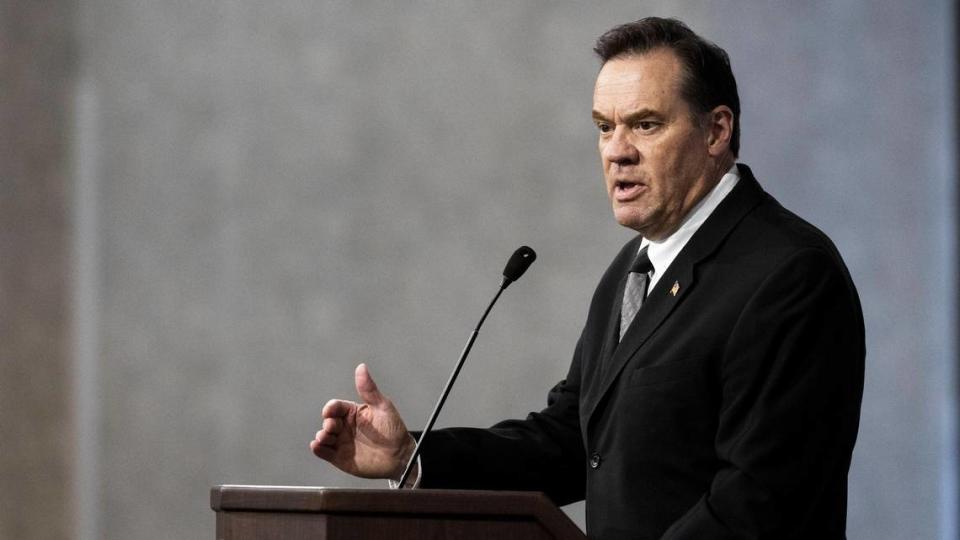Idaho Congressman Russ Fulcher on the debt ceiling debate: ‘We have the leverage’ | Opinion
- Oops!Something went wrong.Please try again later.
- Oops!Something went wrong.Please try again later.
- Oops!Something went wrong.Please try again later.
It’s not often when the band of conservatives in the House Freedom Caucus are in concert with their more liberal counterparts, Main Street Republicans. But the two factions are in lockstep on the debate over the debt ceiling and are united behind the GOP efforts to cut spending.

Republicans have outright rejected President Biden’s idea of raising the debt ceiling with no strings attached. And since Republicans hold a slim majority in the House, they are playing a pivotal role in deciding whether government operations continue after June 1.
Idaho Congressman Russ Fulcher says the GOP’s resolve is firm.
“When the House digs in, and the House has dug in on this issue, it’s similar to the state Legislature,” said Fulcher, a former state senator. “When the House buckles down on something, we’re going to get it, or something close to it.”

It’s hard to imagine Biden and Democrats going for the Limit, Save, Grow Act — the House-backed plan that Republicans brought to the table in the debt-ceiling negotiations with the president. But as Republicans will say, it beats allowing the government to default on its financial obligations and potentially sending the country into fiscal chaos — which no one on either side of the aisle seriously wants, aside from former President Trump.
“We did our job and came up with a plan. There has been nothing put on the table by the White House and nothing by the Senate; we’ve done it,” Fulcher said. “We have the leverage on this issue.”
Fulcher says if the end result is a temporary shutdown of some government operations, then so be it. But he agrees with fellow Idaho Congressman Mike Simpson that a default is not an attractive option.
“The government would be unable to pay its bills — including military salaries, retirement benefits and wages earned by federal employees. Actually, defaulting would cause massive damage to our recovering economy and plunge the world into a financial crisis,” Simpson wrote in a recent op-ed.
But Simpson, while promoting the Limit, Save and Grow Act, added that it would be irresponsible to raise the debt ceiling without spending reductions. “The bill saves approximately $50-$60 billion, not by cutting critical programs, but by rescinding unspent COVID-19 emergency funding. The Biden administration used the COVID-19 pandemic as an excuse to spend $1.9 trillion through the American Rescue Plan, even though we still had $1 trillion in unspent emergency funds available at the time.”
Fulcher says there is pushback on the Republican plan, which includes adding work requirements for government-relief programs. But at least members of Congress are giving more thought about their spending practices.
“If we held to this plan, we will cut the debt level by $4.8 trillion in 10 years. It doesn’t sound like a lot, and some will say it’s not nearly enough, but it’s a paradigm shift in thinking,” Fulcher says. “We are on the fiscal highway to hell, and the president needs to realize it.”
Don’t take Fulcher’s word for it. The nonpartisan Congressional Budget Office estimates that the national debt, which is more than $31 trillion today, will go to more than $52 trillion in 10 years, drawing pointed comments from Rep. Joey Arrington, chairman of the House Budget Committee.
“President Biden’s reckless spending and failed economic policies — like excessive taxes, burdensome regulations, dependency perpetuating welfare without work, and costly assault on U.S. energy — have led to record inflation, soaring interest rates and a shrinking and weaker economy,” Arrington said in a letter to his Republican colleagues.
Arrington’s letter, along with the gloomy CBO report about budget deficits, was distributed to House Republicans and is fresh on their minds as the debt-ceiling debate continues. As Fulcher observes, it’s one more reason Republicans will not go along with the president’s “no-strings-attached” approach.
On the Senate side, Idaho’s Republican Sens. Mike Crapo and Jim Risch have made it clear that they will not support raising the debt ceiling without spending cuts or reforms to the budget process.
Don’t hold your breath for a solution that will make everybody happy. One thing for certain is that it will be a long summer if things don’t get worked out soon.
Chuck Malloy is a longtime Idaho journalist and columnist. He may be reached at ctmalloy@outlook.com

